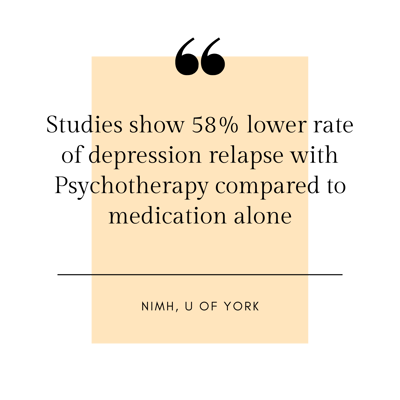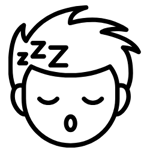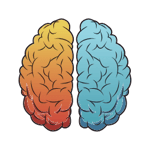Depression Counselling
Get relief from depression and back to feeling like yourself

What is Depression?
Depression Counselling for Kitchener Waterloo
Depression is a mental health disorder that can be characterized by symptoms of low mood, feelings of sadness, and loss of interest or pleasure in activities for long periods of time.
Although the societal stigmatization surrounding depression exists, it is a very common mental health condition that can affect anyone at any stage of life.
In fact, depression is the leading cause of disability worldwide affecting more than 250 million people annually.
The longevity and severity of depression varies on a case-by-case basis, but in all forms can have negative impacts on work, personal life, physical health and daily functioning.

Symptoms of Depression
Am I showing signs of depression?
Depression can vary widely from person to person but is typically classified as experiencing one or more of the following signs of depression for at least two weeks and can negatively impact ones work or school performance and/or personal relationships:

Loss of joy or excitement
Those with depression may no longer find pleasure in things that used to bring them joy. Loss of interest can include work, hobbies, sex or social life

Excess fatigue
Depression can result in decreased energy, increased fatigue and sense of being 'slowed-down'. Symptoms vary by person but insomnia and restlessness are also common.

Loss of appetite
Changes in appetite can occur. Resulting in weight loss or weight gain unrelated to dieting. This can be related to the loss of joy or excitement in food overall or emotional eating.

Feelings of hopelessness
A sense of hopelessness includes feelings of guilt, low self worth, uselessness, self-doubt and a strong belief that life will never get better.

Lapses in memory
Depression can have a significant impact on concentration, memory and the ability to make decisions. A general sense of feeling a 'clouded mind' can be prevalent.

Suicidal thoughts
Recurring thoughts of death or suicide can occur i.e "they would be better off without me" Suicidal thoughts must be taken seriously, ~800,000 people die from suicide every year.
Lets us Help you Find the Right Match
Right Therapist, Right Plan, Real Support
Evidence‑based therapy plus the right counselling match helps you move from coping to thriving—on a schedule that sticks.
How Can Therapy Help With Depression?
Depression is a mental health disorder, adequately trained mental health professionals have experience working with clients in depression counselling.
Numerous studies have found therapy to be effective for treating depression (especially mild to moderate depressive disorders).
.png)
Therapy helps you understand your emotions and find effective ways to manage depression.
Depending on the severity of the depression, a combination of psychotherapy and medications may prove to be the most effective to alleviate symptoms and feel better.
The use of psychotherapy and depression counselling has been found to be much more effective at preventing relapse of depression in the future
There are many different forms of psychotherapy that have been found to be effective in treating depression, your therapist will work with you to identify the best approach to treatment for you. Two of these methods are Eye Movement Desensitization and Reprocessing (EMDR) and Cognitive Behavioral Therapy (CBT).
.png?width=400&height=400&name=Bisque-and-White-Traditional-Life-Quote-Instagram-Post-1%20(1).png)
What does Depression feel like?
Support Starts Here
Therapy can help you understand the root causes of depression, while also giving you practical tools to manage symptoms and get back to your daily life.

About 1 in 5 young people will experience depression before the age of 18
Canadian Mental Health Association
Depression is the leading cause of disability worldwide, affecting 250 million people annually
World Health Organization
FAQs
Therapy works best when the 'fit' is right with your therapist. That’s why we carefully match you with someone whose expertise fits your needs and preferences. Building a strong therapeutic relationship is key to creating a supportive and effective experience.
Before meeting your therapist, you’ll complete a brief intake form. Your first 50‑minute session focuses on what brings you in, your goals, relevant history, and what success would look like. We’ll explain confidentiality and co‑create a plan so you know what comes next. It’s normal to feel nervous—your therapist will guide the pace.
The frequency of sessions depends on your needs and goals. Many people start with weekly or bi-weekly appointments and adjust as they make progress. The total number of sessions is unique to you—your therapist will work with you to find the right approach.
We offer evidence-based therapies like CBT, often the starting point for many people. Depending on your situation, approaches such as Mindfulness-Based Cognitive Therapy, ACT, or Emotion-Focused Therapy can also be effective in improving mood and resilience. Online CBT is available for many clients, and your therapist will work to personalize the right fit to your goals and comfort level.
Most of our services are covered by extended health benefit plans. Coverage varies with every plan, so please check your specific plan or contact your provider to confirm your benefits.
Most employer benefits cover therapy with a Registered Social Worker (MSW, RSW) or a Registered Psychotherapist (RP). We can direct bill to most major insurers when your plan allows it; otherwise, we email insurance‑ready receipts after your session.

Last Reviewed Aug 5 2025 by Katelyn Regier
Katelyn is a Registered Social Worker with the Ontario College of Social Workers and Social Service Workers (OCSWSSW). She holds a Master of Social Work Degree from Wilfrid Laurier University, and a Bachelor of Arts Degree (Hons) in Criminal Justice & Public Policy from the University of Guelph. Katelyn’s work and passion is centered around creating a safe space where you can feel supported and not alone in your healing journey. Everyone’s path to recovery looks different, and it is Katelyn’s goal to walk with you as you discover what this path looks like for you.
Not sure yet? Let’s talk it through.
If you’d like to ask questions or explore your options first, book a free 20-minute matching consult or give us a call (226-752-8857) . One of our team members will help you find the right therapist and next steps that feel comfortable for you.
%20(1).png?width=200&height=80&name=Trillium%20Counselling%20Logo%20(999%20x%20398%20px)%20(1).png)

















